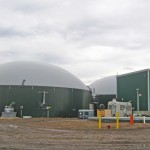Reading Time: 4 minutes It’s no secret the beef industry is under attack from environmentalists and activists — or that they frequently distort the truth. “They have an agenda that they are trying to gain information to support — they’re looking for things that have gone awry in the industry, and there have been problems,” renowned Alberta cattle researcher […] Read more

Top scientist challenges beef industry to do better
Yes, anti-meat activists distort the facts, says Tim McAllister — but ‘there is science that supports their position’

Man-made warming dates back almost 200 years, study says
Oslo | Reuters — Man-made greenhouse gases began to nudge up the Earth’s temperatures almost 200 years ago, as the Industrial Revolution gathered pace, far earlier than previously thought. Greenhouse gas emissions from industry left their first traces in the temperatures of tropical oceans and the Arctic around 1830, researchers wrote in a recent journal […] Read more

Grasslands a carbon-capture colossus
Do the math: Take Alberta $15-per-tonne carbon tax and then look at how much carbon is stored in grasslands
Reading Time: 3 minutes If the Alberta government really wants to reduce greenhouse gas emissions in the province, it should start with an incentive for farmers to reduce annual cropping, says a rangeland management expert. “There’s a pretty compelling case about why there should be a direct economic incentive for producers to maintain or even increase the amount of […] Read more

Call it a win-win: Curbing pollution with chicken manure
Scientists have found a type of micro-algae that gobbles up greenhouse gas emissions — and it has a taste for nutrient-rich chicken manure, too
Reading Time: 3 minutes Poultry manure and that annoying green slime which grows in our lakes each summer could hold the key to helping the province’s oilsands mining companies and coal-fired power plants clean up their act, while producing a valuable commodity in the process. Researchers have discovered a strain of naturally occurring micro-algae that can scrub 100 per […] Read more

Ottawa’s new GHG goal eyes fertilizer, chem sectors
The federal government’s new target, to cut the country’s greenhouse gas (GHG) emissions by 30 per cent below 2005 levels in the next 15 years, will involve new regulations on fertilizer and chemical companies’ output. Environment Minister Leona Aglukkaq announced the government’s new target and general plans on Friday in Winnipeg, but hasn’t yet specified […] Read more

Canola growers want province to push biodiesel
Effort would create more demand and help with reductions in greenhouse gases
Reading Time: 2 minutes The new provincial government needs to walk the walk — not just talk the talk — on climate change, starting with better support for renewable energy sources, says the general manager of Alberta Canola Producers Commission. “In their election platforms, almost all political parties talk about climate change and greenhouse gas reduction,” said Ward Toma. […] Read more

Southern Alberta farm leading the way in green energy
Chris and Harold Perry have added anaerobic digesters to thermal and solar power generation on their Chin-area farm
Reading Time: 3 minutes Chris and Harold Perry take the power of science and sustainable farm practices very seriously. The southern Alberta farmers call it their “2020 vision” — reduce farm inputs such as water, fuel, electricity, and synthetic fertilizer by 20 per cent while increasing net yields by 20 per cent. And they don’t think small. In November, […] Read more

